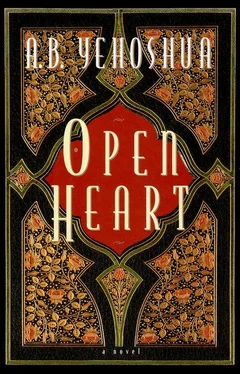A. Yehoshua - Open Heart
Здесь есть возможность читать онлайн «A. Yehoshua - Open Heart» весь текст электронной книги совершенно бесплатно (целиком полную версию без сокращений). В некоторых случаях можно слушать аудио, скачать через торрент в формате fb2 и присутствует краткое содержание. Год выпуска: 2014, Издательство: Peter Halban, Жанр: Современная проза, на английском языке. Описание произведения, (предисловие) а так же отзывы посетителей доступны на портале библиотеки ЛибКат.
- Название:Open Heart
- Автор:
- Издательство:Peter Halban
- Жанр:
- Год:2014
- ISBN:нет данных
- Рейтинг книги:3 / 5. Голосов: 1
-
Избранное:Добавить в избранное
- Отзывы:
-
Ваша оценка:
- 60
- 1
- 2
- 3
- 4
- 5
Open Heart: краткое содержание, описание и аннотация
Предлагаем к чтению аннотацию, описание, краткое содержание или предисловие (зависит от того, что написал сам автор книги «Open Heart»). Если вы не нашли необходимую информацию о книге — напишите в комментариях, мы постараемся отыскать её.
Open Heart — читать онлайн бесплатно полную книгу (весь текст) целиком
Ниже представлен текст книги, разбитый по страницам. Система сохранения места последней прочитанной страницы, позволяет с удобством читать онлайн бесплатно книгу «Open Heart», без необходимости каждый раз заново искать на чём Вы остановились. Поставьте закладку, и сможете в любой момент перейти на страницу, на которой закончили чтение.
Интервал:
Закладка:
Before we set out I decided to offer a little ride to Amnon’s retarded brother, who was standing and looking at the Honda with an admiring expression on his face. I put my helmet on his head and rode slowly between the houses of the kibbutz. He was very excited and frightened, and held on to me tightly from behind. His parents thanked me warmly. When we left the illuminated area of the kibbutz for the Arava road, we realized how much light was pouring from the moon, which had risen an hour before from the direction of the Jordan River, enabling us to get up to a good speed on the ruler-straight road. After thirty minutes we had already reached the Arava junction, and after another twenty we passed the white potash works of Sodom, where we slowed down a little on the winding road next to the Dead Sea, not just to enjoy the magnificent contours of the mountains of Edom in the bright moonlight but mainly in order not to miss my parents’ hotel, which turned out to be a new, recently opened place set a little apart from the others. It was a quarter past ten when Amnon succeeded in making out the little signpost directing us onto a dirt road, and we found the hotel in darkness. Since my parents had notified the hotel that they would be arriving late, the reception clerk was not surprised to see them, although he was somewhat startled at the sight of the black-helmeted motorcyclist carrying their luggage. “Perhaps we can find a room for you and Amnon to spend the night here,” my mother suggested. Amnon received this proposal gladly. He was worn out after the tiring day, which had come directly on top of his night job, and he liked the idea of spending the whole night going over his experiences at the wedding with me. But I refused. I was impatient to get back to my apartment and be by myself, to digest everything that had happened and to think about Michaela and the role she might play in my life. “Don’t worry,” I said to my parents, “it’s a very clear night, and the Honda’s running perfectly. The two of us will take care of each other,” a beloved phrase of my father’s which I always added when I went out at night with a friend. We had black coffee in the hotel lobby, and I bought a small bar of chocolate from one of the vending machines to appease my gnawing hunger. I took a spare helmet out of the black box at the back of the motorcycle for Amnon, and we started off. Meanwhile the moon had disappeared on its westward wanderings, and the sky was now full of an astonishing abundance of stars. The coastal road leading to the Jericho junction was completely deserted, and we could ride right down the middle, as if it were our private road. From the way that Amnon was clutching my waist I could sense his alarm as I kept gaining speed, but after a while he began to relax and lifted his head up to enjoy the journey. The rocky mass of Masada soon appeared on our left, looking in the stillness of the night like an ancient aircraft carrier which had risen from the depths of the sea. A few minutes later the lights on the fence of Kibbutz Ein Geddi appeared, and the buildings of the field school above the creek of Arugoth. The road began climbing steeply to the top of the cliff, and it was all I could do to restrain the motorcycle from flying off it in my enthusiasm at the sight of the steely expanse of the Dead Sea spread out below us. And then came the descent to the shores of the sea, as we coasted past Mizpeh Shalem to a stretch of straight, level road where the motorcycle could easily hit ninety miles an hour. We didn’t even notice the turnoff to the Ein Feshka hot springs, and if not for the curve in the road after the Qumran caves we might have raced past them too without even noticing their existence. Only the imposing silhouette of the abandoned old hotel looming up on the Kalya shore told us that we were about to take our leave of the lowest place in the world. And then the Almagor junction was upon us, its green signs pointing us to the west, to the mild ascent leading to the city of our common childhood, Jerusalem.
“But when are we going to get a chance to discuss your astrophysical theory, Benjy?” Amnon yelled despairingly into my ear, realizing that at the speed I was going he would soon find himself on the sidewalk outside his house in Tel Aviv, before he had had a chance to rescue me from my ridiculous mistakes about A Brief History of Time . “You’re right,” I shouted back. “I thought we could go and sit in the Atara or some other café in downtown Jerusalem, but perhaps it’s already too late for that — Jerusalem’s not Tel Aviv. So why don’t I just stop somewhere along the road? Maybe the open sky will help me to explain my ideas.” And after Mitzpeh Jericho, in a place called the Mishor Adumim, I left the main road and drove up a short dirt track leading to something halfway between a tree and a bush stuck on top of a little hill, over which the heavens were spread out like a brilliant canopy, infinite but also intimate, gathering even the distant spires of Jerusalem into its folds. I took off my helmet and prepared to expound to my friend in the stillness of the night the theory that had been elaborating itself in my brain over the past few weeks. But first I had to warn him not to interrupt me, however strange my words might sound to him, for new ideas always seemed ridiculous at first. He snickered to himself and sat down on the ground. For some reason he didn’t take off his helmet, and he looked like an absentminded space traveler who had arrived here from some other planet. There was a rustle in the branches of the tree next to us, apparently made by birds we had startled from their sleep.
“Hawking himself admits,” I began, “that he has two unsolved problems, the problem of the beginning and the problem of the end, which are of course not separate from each other. The first problem is connected to Guth’s theory about the inflationary expansion, during which the universe expanded at a rapidly increasing rate in the first split seconds after the big bang. And the second problem is what’s going to happen to the universe in the end. Hawking denies the possibility that the universe will go on slowly expanding forever, since the force of gravity, which I was surprised to read is the weakest of all the forces of nature, but which is also strong because it has no antithesis, will increase in the expanding universe until the gravity and the expansion balance each other and the universe stops expanding. But in this case we have to ask, where’s the symmetry between the dramatic, mysterious, incomprehensible beginning of the big bang, which from a point of zero size but also of infinite density, gave birth to this whole tremendous universe — between that and what will remain in the end, a kind of static universe without any movement, in which a perfect and absolute balance between gravity and expansion will pertain? What’s the connection between the beginning and the end? This is what I ask myself. Are you with me?” He nodded hesitantly. Presumably he was already dying to correct me, but he restrained himself. “It simply doesn’t make sense for there to be a beginning that has no identity or connection with the end. Because that would mean that there was a beginning to time and there was some intention in this beginning, and they’ll still say there’s a God too, which Hawking categorically denies. And in the last chapter he says that we have to assume that just as the universe began with a big bang, it will end in a big crunch, with complete contraction and collapse, and then there’ll be a connection between the beginning and the end, which will turn into the beginning again, for this is the only conceivable cycle.” A worried, suspicious expression now appeared on Amnon’s face, as if he felt that his friend was beginning to say things that were completely illogical, and even childish. But I hurried on, to forestall him until I came to my main point. “In brief, what I want you to think about, because it’s possible that there a lot of things I don’t understand here, is that the shrinking of the universe will not take place according to the physical laws of expansion and gravity, which Hawking and the others have a problem with, but will be accomplished by the human spirit, because spirit isn’t something alien to the universe. Even the first minute particle, which possessed zero volume but infinite density, and from which the big bang began — you yourselves say that not only all the material possibilities we see before us were inherent in it, but also all the laws of physics, chemistry, and biology. In short everything, including ourselves as biological entities, and of course our thoughts too, and our feelings, in other words the whole human spirit, was inherent in that point of departure. And therefore it’s this spirit which will shrink the universe back to the original starting point, which was, in the last resort, what? If Hawking himself says that it was like a particle whose volume was zero but whose density was infinite, what’s that? Matter? No, only spirit, or what I call spirit.”
Читать дальшеИнтервал:
Закладка:
Похожие книги на «Open Heart»
Представляем Вашему вниманию похожие книги на «Open Heart» списком для выбора. Мы отобрали схожую по названию и смыслу литературу в надежде предоставить читателям больше вариантов отыскать новые, интересные, ещё непрочитанные произведения.
Обсуждение, отзывы о книге «Open Heart» и просто собственные мнения читателей. Оставьте ваши комментарии, напишите, что Вы думаете о произведении, его смысле или главных героях. Укажите что конкретно понравилось, а что нет, и почему Вы так считаете.












